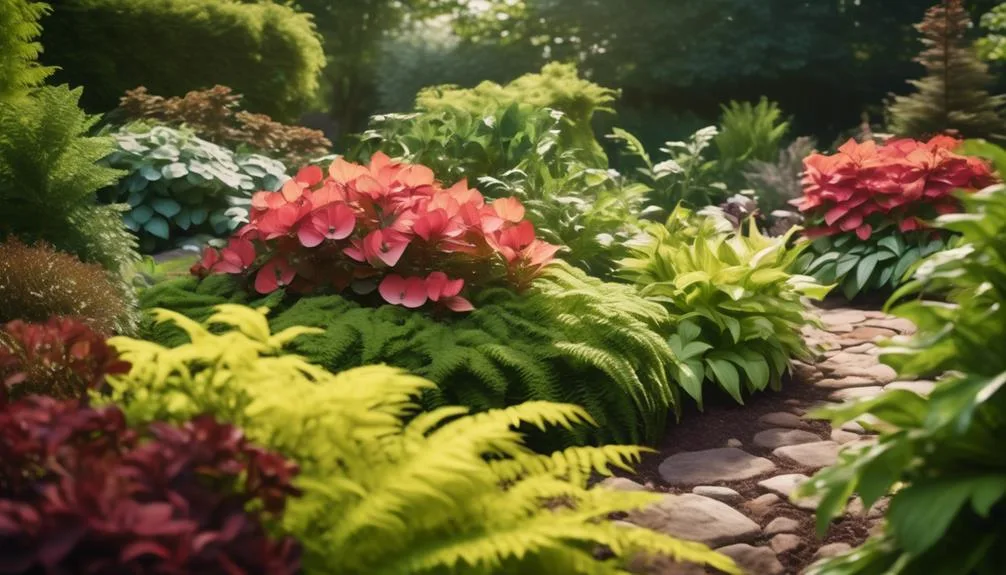Enhance your dogwood trees with the perfect companion plants.
Wondering which plants will complement the elegance of your dogwoods while promoting a thriving garden environment?
From vibrant flowers to lush ground cover, there's a variety of options to explore.
By choosing the best companion plants for your dogwood trees, you can create a harmonious and visually appealing landscape.
Whether you want to add color, texture, or year-round interest to your garden, finding the ideal companions for your dogwoods is essential for a stunning outdoor space.
Shade-Loving Companion Plants
If you're looking to enhance the beauty of the shaded area beneath your dogwood trees, consider planting shade-loving companions that thrive in the dappled light and cool conditions provided by these majestic trees.
When it comes to shade-loving plants, container gardening can be a fantastic option. It allows you to control the soil conditions and easily move the plants to optimize their exposure to light.
Prior to planting, ensure proper soil preparation. Dogwood trees prefer acidic, well-draining soil, so choose companion plants that share similar preferences. Incorporating organic matter into the soil can improve its texture and fertility, providing an ideal environment for both the dogwood tree and its companions.
Flowering Companion Plants
Enhance the visual appeal of your dogwood tree's surroundings by selecting flowering companion plants that complement its elegant blossoms and thrive in the dappled light of the shaded area. When choosing pollinator-attracting companion plants, consider adding bee balm, which produces showy, nectar-rich flowers that entice bees and butterflies while enhancing the overall beauty of the landscape.
Another excellent option is the delicate blooms of astilbe, which not only thrive in the same conditions as dogwood trees but also attract pollinators, adding a lively buzz to your garden.
For seasonal color, consider planting spring-blooming bulbs such as daffodils or tulips to create a vibrant display under the dogwood's canopy.
Additionally, incorporating summer-blooming companions like hydrangeas can provide a stunning contrast and ensure your garden is bursting with color throughout the season.
Evergreen Companion Plants
Consider adding an evergreen companion plant to your dogwood tree to maintain year-round interest and provide a lush backdrop for the tree's seasonal changes.
When selecting companion plants, look for container-friendly evergreen options like dwarf conifers or boxwood. These plants aren't only easy to care for but also provide a striking contrast to the dogwood's changing foliage throughout the year.
Additionally, consider drought-resistant evergreen options such as juniper or yucca to minimize watering needs and create a low-maintenance yet visually appealing garden.
Evergreen companions not only offer a beautiful green backdrop during the winter months but also enhance the overall aesthetic of your garden by complementing the dogwood tree's unique features.
Incorporating these evergreen plants will ensure that your garden remains vibrant and attractive year-round.
Ground Cover Companion Plants
To create a lush and visually appealing ground cover for your dogwood tree, explore options such as creeping phlox or pachysandra to add color and texture to the base of the tree.
When selecting ground cover companion plants for your dogwood tree, consider the soil moisture levels in the area. Creeping phlox, for example, thrives in well-drained soil, while pachysandra can tolerate a range of soil moisture levels but prefers moist, well-drained soil. Proper soil moisture is essential for the health and growth of these companion plants, so be mindful of the moisture needs of each species.
Additionally, when it comes to fertilizer application, both creeping phlox and pachysandra benefit from a balanced fertilizer in the spring to support their growth and flowering.
Native Companion Plants
Explore the wide variety of native companion plants that can further enrich the ground cover around your dogwood tree, complementing its natural beauty and enhancing the overall ecosystem. Native companion plants not only add visual interest but also attract beneficial insects and pollinators, creating a thriving environment. Additionally, selecting drought-tolerant plants contributes to water conservation and reduces the need for excessive watering. Here are some native companion plants to consider for your dogwood tree:
| Pollinator Friendly | Beneficial Insects | Drought Tolerant |
|---|---|---|
| Wild Bergamot | Goldenrod | Purple Coneflower |
| Bee Balm | Joe Pye Weed | Black-Eyed Susan |
| Butterfly Weed | Milkweed | Little Bluestem |
These native companion plants not only enhance the aesthetics of your garden but also support a healthy and sustainable ecosystem.
Conclusion
Choosing the right companion plants for your dogwood trees is crucial for a beautiful and thriving garden. Whether it's shade-loving, flowering, evergreen, ground cover, or native plants, the options are plentiful.
By carefully considering your environment, you can create a stunning and harmonious landscape that both you and your furry friends will love to explore.
Happy planting, and may your garden flourish with beauty and diversity!

My interest in trees started when I first saw the giant sequoias in Yosemite.
I was a teenager then, and I remember thinking, “I need to learn more about this.”
That moment stuck with me.
A few years later, I went on to study forestry at Michigan Tech.
Since graduating, I’ve worked in a mix of hands-on tree care and community education.
I’ve spent over ten years helping people understand how to plant, maintain, and protect the trees in their neighborhoods.
I don’t see trees as just part of the landscape.
They are living things that make a real difference in our daily lives.
